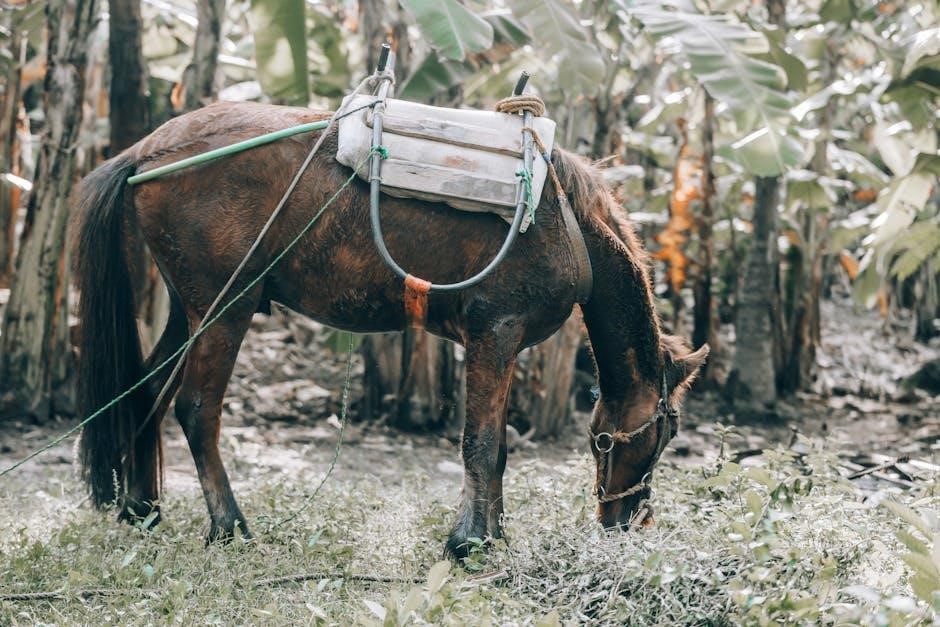Upton Sinclair, a renowned American journalist and novelist, exposed the harsh realities of the meatpacking industry in his 1906 novel, The Jungle. Available as a PDF, it remains a pivotal work in American literature, highlighting worker exploitation and sparking significant food safety reforms.
1.1. Brief Biography of Upton Sinclair
Upton Sinclair, born on September 20, 1878, and passing on November 25, 1968, was a prominent American journalist, novelist, and political activist. Known for his commitment to social justice, Sinclair began his career writing for newspapers and magazines, eventually gaining fame with The Jungle. The novel exposed the harsh conditions faced by immigrant workers in the meatpacking industry, leading to significant reforms. Sinclair’s works often reflected his socialist ideals, and he remained a prolific writer throughout his life, authoring over 90 books. Despite his extensive bibliography, The Jungle remains his most enduring and influential work.
1.2. Historical Context of The Jungle
The Jungle, published in 1906, was written during a period of significant social and industrial change in the United States. The novel reflects the harsh realities of the Gilded Age and the Progressive Era, focusing on the exploitation of immigrant workers in the meatpacking industry. Sinclair’s exposé revealed unsanitary conditions and the mistreatment of laborers, leading to public outrage and reforms. The book’s historical significance lies in its role as a catalyst for the Meat Inspection Act of 1906 and its influence on labor rights movements. As a PDF resource, The Jungle continues to educate readers about early 20th-century industrial abuses and their societal impact.
1.3. The Novel’s Purpose and Impact
Upton Sinclair wrote The Jungle to expose the exploitation of immigrant workers in the meatpacking industry, aiming to provoke social and political change. The novel’s vivid portrayal of unsanitary conditions and worker mistreatment shocked the public, leading to the passage of the Meat Inspection Act of 1906. While Sinclair’s primary goal was to highlight labor injustices, the book unexpectedly spurred food safety reforms. Its impact extended beyond literature, influencing labor movements and remaining a powerful critique of capitalism. Available as a PDF, The Jungle continues to educate readers about its historical significance and the ongoing relevance of its themes in modern society.
The Jungle as a Literary Work
The Jungle is a landmark of realist literature, offering a gritty portrayal of industrial life and worker exploitation, while showcasing Sinclair’s direct and impactful writing style.
2.1. Literary Genre and Style
The Jungle falls under the genre of Realist literature, offering a gritty and unflinching portrayal of industrial life in early 20th-century America. Sinclair’s writing style is direct and confrontational, aiming to shock readers with vivid descriptions of the meatpacking industry’s horrors. The novel blends journalistic detail with narrative storytelling, creating a powerful exposé that highlights the exploitation of immigrant workers. Sinclair’s use of graphic imagery, such as men being turned into lard, underscores the brutality of the industrial system. His prose is straightforward yet evocative, making the novel both a literary masterpiece and a call to action.
The blend of realism and socialist ideals gives The Jungle its distinctive voice, ensuring its enduring relevance in American literary history.
2.2. Key Themes in The Jungle
The Jungle by Upton Sinclair explores several profound themes, with the most prominent being the exploitation of immigrant workers and the harsh realities of industrial capitalism. Sinclair vividly portrays the struggle for survival among immigrant families in Chicago, highlighting their poverty, poor working conditions, and lack of social support. Another central theme is the loss of individuality as workers are reduced to mere cogs in the industrial machine. The novel also critiques the corruption and greed of industrial masters, exposing the unsanitary practices in the meatpacking industry. Additionally, Sinclair emphasizes the importance of collective action and the potential for socialism to address these injustices. These themes remain relevant, making The Jungle a powerful commentary on social and economic inequality.

2.3. Critical Reception and Reviews
Upton Sinclair’s The Jungle received widespread critical attention upon its release in 1906, primarily for its shocking portrayal of the meatpacking industry and exploitation of workers. Sinclair’s vivid descriptions of unsanitary conditions and worker mistreatment sparked public outrage, leading to significant reforms. Critics praised the novel for its unflinching realism and moral urgency, though some argued its graphic imagery bordered on sensationalism. The book’s impact extended beyond literature, influencing food safety legislation and labor rights movements. Despite its controversial nature, The Jungle remains a landmark of American realist literature, celebrated for its ability to provoke change and its enduring relevance to social justice issues.

The Plot and Characters
The novel follows Lithuanian immigrant Jurgis Rudkus and his family as they face exploitation and hardship in Chicago’s meatpacking industry, exploring themes of struggle and resilience.
3.1. Main Plot Summary
The Jungle by Upton Sinclair tells the story of Jurgis Rudkus, a young Lithuanian immigrant who moves to Chicago with his family in search of a better life. The novel begins with their arrival and the hopeful wedding of Jurgis to Ona, but their optimism quickly fades as they face the harsh realities of working-class life. Jurgis finds work in the city’s brutal meatpacking industry, where workers endure exploitative conditions, poor wages, and unsanitary practices. As the family struggles to survive, they are hit by a series of tragic events, including Ona’s death, the loss of their home, and Jurgis’s eventual imprisonment. The novel climaxes with Jurgis abandoning his family and later discovering socialist ideals, which offer him a new sense of purpose. The story is a powerful critique of industrial capitalism and its impact on immigrant workers.
3.2. Protagonist Jurgis Rudkus
Jurgis Rudkus, the protagonist of The Jungle, is a young, determined Lithuanian immigrant who moves to Chicago with his family in search of a better life. Driven by strength and resilience, Jurgis initially embodies hope and optimism, believing in the American Dream. However, the harsh realities of industrial labor and poverty gradually erode his spirit. Throughout the novel, Jurgis faces immense personal and financial struggles, including the loss of loved ones and the degradation of his working conditions. His journey reflects the exploitation of immigrant workers and the dehumanizing effects of capitalism. Ultimately, Jurgis’s experiences lead him to embrace socialist ideals, symbolizing a shift from individual despair to collective hope.
3.3. Supporting Characters and Their Roles
The supporting characters in The Jungle play crucial roles in shaping Jurgis’s journey and highlighting the novel’s themes. Ona, Jurgis’s wife, represents vulnerability and resilience, enduring immense hardship while maintaining emotional strength. Marija, Jurgis’s sister, symbolizes the destructive forces of poverty and exploitation, as she descends into despair and prostitution. Tamoszius, the family’s friend and musician, embodies cultural pride and communal bonds, offering fleeting moments of joy. Phil Connor, the corrupt foreman, exemplifies the oppressive systems that crush workers. Together, these characters illustrate the broader societal struggles and personal sacrifices faced by immigrant workers in industrial Chicago.
Social and Economic Themes
Social and economic themes in The Jungle highlight exploitation, capitalism’s harshness, and systemic poverty, exposing the struggles of workers in industrial America.
4.1. Exploitation of Immigrant Workers
Upton Sinclair’s The Jungle sheds light on the brutal exploitation of immigrant workers in early 20th-century America. Lured by promises of prosperity, immigrants faced deceitful recruitment practices and were trapped in a cycle of poverty. The novel highlights how workers were subjected to long hours, low wages, and dangerous working conditions, with little to no legal protections. Sinclair exposes the systemic exploitation perpetuated by industrialists and corporations, who prioritized profit over human dignity. The plight of these workers underscores the broader social and economic inequalities of the time, revealing the dark underbelly of the American Dream for immigrants seeking a better life.
4;2. The Meatpacking Industry Exposed
Upton Sinclair’s The Jungle exposed the horrifying conditions within the early 20th-century meatpacking industry, revealing shocking truths about unsanitary practices and worker safety. Sinclair depicted the filthy environments where meat was processed, often contaminated with harmful substances. The novel detailed how workers were exposed to dangerous machinery and grueling labor without proper protections. Public outrage over these revelations led to significant reforms, including the passage of the Meat Inspection Act in 1906, which mandated federal oversight of meat production. Sinclair’s work not only changed public perception but also prompted lasting improvements in food safety standards, ensuring safer conditions for both workers and consumers.
4.3. Poverty and Struggle in Industrial Chicago
In The Jungle, Upton Sinclair vividly portrays the devastating poverty and struggle faced by immigrant workers in industrial Chicago. The novel highlights the harsh living conditions, meager wages, and exploitative practices that trapped workers in a cycle of debt and despair. Sinclair describes how families like the Rudkuses endured overcrowded tenements, inadequate healthcare, and the constant threat of unemployment. The novel underscores the stark contrast between the wealth of industrialists and the destitution of their employees, exposing the systemic inequalities perpetuated by unchecked capitalism. These depictions not only evoked public outrage but also shed light on the human cost of industrialization, sparking calls for social and economic reform.

The Role of The Jungle in Food Safety Reforms
The novel exposed unsanitary practices in the meatpacking industry, leading to the 1906 Meat Inspection Act. Public outcry and President Roosevelt’s involvement enforced stricter food safety regulations.

5.1. The Jungle and the Meat Inspection Act

Upton Sinclair’s The Jungle exposed shocking sanitation violations in the meatpacking industry, leading to the 1906 Meat Inspection Act. The novel revealed unsanitary practices, such as diseased animals being processed for human consumption and the use of harmful preservatives. Public outrage pressured President Theodore Roosevelt to investigate, resulting in federal oversight of meatpacking plants. The Act mandated inspections, improved hygiene standards, and ensured truthful labeling of meat products. This legislation marked a significant shift in food safety regulation, directly influenced by Sinclair’s vivid portrayal of industry abuses. The Act remains a cornerstone of U.S. food safety policies, protecting consumer health and holding the industry accountable.
5.2. Public Reaction and Government Response
The publication of The Jungle sparked widespread public outrage over the unsanitary and inhumane conditions in the meatpacking industry. Readers were horrified by descriptions of rotting meat, diseased animals, and the exploitation of workers. President Theodore Roosevelt, initially skeptical of Sinclair’s claims, launched an investigation, which confirmed the novel’s allegations. This led to the passage of the 1906 Meat Inspection Act, aiming to regulate the industry and protect public health. The government’s response addressed not only food safety but also the broader issue of consumer trust, marking a turning point in federal oversight of food production. The novel’s impact was immediate and far-reaching.
5.3. Legacy in Modern Food Safety Standards
Upton Sinclair’s The Jungle left an enduring mark on food safety standards, reshaping regulatory frameworks globally. The novel’s exposé of the meatpacking industry led to the 1906 Meat Inspection Act, which mandated federal oversight of food production. Today, these reforms serve as the foundation for modern food safety protocols. The USDA and FDA continue to enforce stringent regulations to prevent contamination and ensure transparency. Sinclair’s work also inspired consumer advocacy and heightened public awareness of food quality. Its legacy is evident in contemporary efforts to uphold ethical practices and accountability in the food industry, ensuring safer and healthier products for consumers worldwide.
The Jungle as a Political Statement
Upton Sinclair’s The Jungle is a scathing critique of capitalism, exposing worker exploitation and advocating for socialist reform through its vivid portrayal of industrial oppression.
6.1. Sinclair’s Socialist Ideals
Upton Sinclair’s The Jungle reflects his deep-rooted socialist beliefs, which emphasized equality and justice for the working class. Sinclair, a staunch advocate for workers’ rights, wrote the novel to expose the harsh realities faced by laborers in industrial America. Through the struggles of Jurgis and his family, Sinclair critiques the capitalist system, advocating for collective action and systemic change. His socialist ideals are evident in the novel’s portrayal of worker exploitation and the need for a more equitable society. Sinclair’s work not only sought to raise awareness but also to inspire reform, aligning with his vision of a world where labor is valued and protected. His ideals continue to resonate in contemporary discussions of social justice and workers’ rights.

6.2. Critique of Capitalism
Upton Sinclair’s The Jungle delivers a scathing critique of capitalism, exposing its exploitative nature through the harsh realities of industrial Chicago. The novel portrays capitalism as a system that prioritizes profit over people, with workers treated as disposable commodities. Sinclair highlights the dehumanizing effects of factory labor, where workers are subjected to dangerous conditions, meager wages, and little to no protections. The meatpacking industry serves as a stark example of capitalism’s excesses, where greed drives the exploitation of both workers and animals. By depicting the systemic oppression of immigrant labor, Sinclair argues that capitalism fails to provide fair wages or safe working environments, perpetuating cycles of poverty and despair. His critique remains a powerful commentary on economic inequality.
6.3. The Novel’s Influence on Labor Movements
The Jungle played a pivotal role in shaping labor movements in the early 20th century. Its vivid depiction of workplace exploitation and inhumane conditions sparked widespread public outrage, leading to increased scrutiny of industrial practices. The novel inspired labor unions to advocate more forcefully for workers’ rights, including safer conditions, fair wages, and shorter working hours. Sinclair’s exposure of the meatpacking industry’s abuses also galvanized political action, contributing to the passage of labor reforms. By giving voice to the struggles of immigrant workers, The Jungle became a powerful tool for labor activists, fueling the fight for social and economic justice in America.
The Jungle in Popular Culture
The Jungle has influenced various adaptations, including films, stage productions, and even a musical, cementing its impact beyond literature and into broader cultural discourse and activism.

7.1. Adaptations and Interpretations
Upton Sinclair’s The Jungle has been adapted into various forms of media, including films, stage plays, and even a musical, ensuring its message reaches a broader audience. These adaptations have reinterpreted the novel’s themes of exploitation and social justice, resonating with diverse audiences. The availability of The Jungle in PDF format has further facilitated its use in educational and creative projects, inspiring new interpretations. Its timeless themes of worker exploitation and socialism continue to spark artistic reimagining, making it a cornerstone of both literary and cultural discourse.
7.2. The Jungle as a Musical
The Jungle has been adapted into a musical, bringing Upton Sinclair’s powerful narrative to the stage. The musical captures the novel’s gritty realism and emotional depth through a blend of music and drama. It highlights the struggles of immigrant workers and the harsh conditions of the meatpacking industry, resonating with audiences on a visceral level. The adaptation stays true to Sinclair’s socialist themes while offering a fresh, engaging perspective. Available as a PDF, The Jungle continues to inspire creative interpretations, including this musical rendition, which introduces the story to new generations and underscores its enduring relevance.
7.3. Film and Stage Productions
Upton Sinclair’s The Jungle has been adapted into various film and stage productions, each capturing the novel’s intense themes of exploitation and social injustice. The 1914 silent film adaptation, directed by George Irving, was one of the earliest interpretations. Later, a 1954 film version offered a more dramatic take, though it deviated from the original story. Stage productions have also brought the novel to life, with plays emphasizing the emotional and societal struggles of the characters. These adaptations highlight the enduring power of Sinclair’s work, making it accessible to audiences beyond the written word. The PDF version of The Jungle remains a vital resource for studying these creative interpretations.

The Jungle and Modern Relevance
The Jungle remains a powerful commentary on modern social justice, income inequality, and workers’ rights, resonating with contemporary debates on labor exploitation and immigration.
8.1. Contemporary Social Justice Issues
The Jungle continues to resonate with modern social justice movements, highlighting systemic inequities, worker exploitation, and unsafe labor conditions. Its themes of economic disparity and human rights abuses align with contemporary debates on income inequality, labor rights, and immigration reform. The novel’s depiction of marginalized communities struggling against oppressive systems mirrors today’s fights for fair wages, safe workplaces, and racial justice. Sinclair’s exposé remains a powerful tool for advocating systemic change, inspiring new generations to address these enduring issues. The availability of The Jungle as a PDF ensures its message reaches a broader audience, fueling ongoing activism and awareness.
8.2. The Novel’s Relevance to Immigration Debates
The Jungle remains a poignant commentary on immigration debates, shedding light on the exploitation and challenges faced by immigrants in the early 20th century. Sinclair’s portrayal of Lithuanian immigrants in Chicago’s meatpacking industry highlights their struggles with poverty, language barriers, and workplace abuses. These themes resonate today, as contemporary immigration debates often center on labor rights, integration, and systemic inequality. The novel’s vivid depiction of immigrant struggles serves as a historical lens through which modern readers can understand the enduring complexities of immigration. Its availability as a PDF ensures accessibility, allowing new generations to engage with these timeless issues and their relevance to current policies and discussions.
8;3. The Jungle in Educational Curricula
The Jungle is widely incorporated into educational curricula due to its historical significance and thematic relevance to social justice and labor rights. Educators use the novel to explore themes like immigration, industrial exploitation, and economic inequality, making it a valuable resource for critical thinking and discussion. Its availability as a PDF enhances accessibility, allowing students to easily analyze and reference the text; The novel’s inclusion in syllabi reflects its enduring importance in understanding the intersection of literature, history, and societal issues. This digital format also supports modern teaching methods, ensuring Sinclair’s message remains relevant for future generations of learners and scholars.

The Jungle as a PDF Resource
The Jungle is widely available as a PDF, making it easily accessible for readers worldwide. Its digital format enhances readability and portability, ensuring Sinclair’s impactful story reaches a broader audience while maintaining its historical and literary significance.
9.1. Availability of The Jungle in PDF Format
The Jungle by Upton Sinclair is readily available in PDF format, ensuring easy access for readers worldwide. As a public domain work, the novel can be downloaded for free from various online platforms such as Google Books, Project Gutenberg, and ManyBooks. This accessibility makes it convenient for students, researchers, and enthusiasts to explore Sinclair’s seminal work without cost or logistical barriers. The PDF format also allows readers to access the book on multiple devices, including smartphones, tablets, and e-readers, making it a flexible option for modern audiences. This widespread availability has helped preserve the novel’s relevance and reach.
9.2. Benefits of Digital Access
The digital availability of Upton Sinclair’s The Jungle in PDF format offers numerous benefits for readers. It provides instant access to the text, eliminating the need for physical storage space. Digital versions are often free, making the novel accessible to everyone, especially students and researchers. The PDF format allows for easy searching, highlighting, and annotating, enhancing study and analysis. Additionally, digital access reduces the environmental impact of printing and transporting books. Readers can carry multiple copies across devices, ensuring convenience. These advantages make The Jungle more accessible and user-friendly for modern audiences while preserving its historical and literary significance.
9.3. Popular Platforms for Download
Several platforms offer easy access to Upton Sinclair’s The Jungle in PDF format. Project Gutenberg, a leading source for free eBooks, provides a downloadable version. ManyBooks also offers the novel for free, with options for various e-readers. Google Books allows users to preview and download the text. Additionally, Internet Archive hosts the book, ensuring accessibility. Platforms like Libgen and PDF Drive are popular for direct downloads. These sites are reliable and widely used, making The Jungle readily available to readers worldwide. They cater to diverse preferences, ensuring the novel remains accessible in the digital age.

